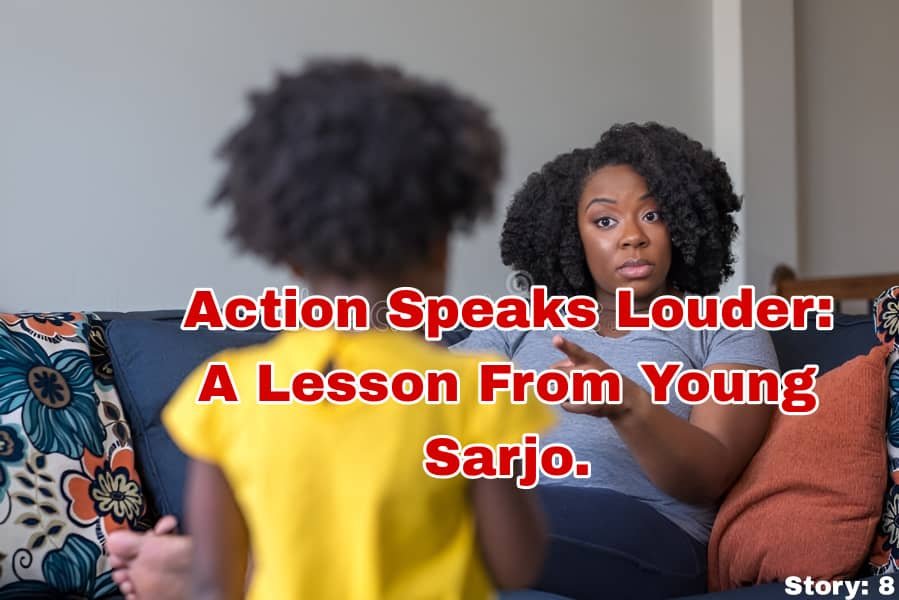Actions Speak Louder: A Lesson from Sarjo
𝑩𝒚: 𝑺𝒖𝒍𝒂𝒚𝒎𝒂𝒏 𝑵𝒋𝒊𝒆 (𝑺𝒐𝒍 𝑺𝒍𝒊𝒎)
One of the country's most densely populated places and its district, nestled between commercial and strategic residential, lived a family that was well-known in the community. Salimata was the wife of a respected councillor, a man often busy with his ward affairs. She was a woman of charm but carried a habit of saying her husband was absent even when he was present while at home. This practice continued even in front of their young and perceptive daughter, Sarjo.
One sunny afternoon, Salimata saw a familiar face approaching from her sitting room window. It was Abou Sey, the hire purchase personnel known locally as a "bechek." He had kindly provided them with utensils to be paid for in small installments, and he was there to collect the due payment. As soon as she spotted him, Salimata hurried to her bedroom and instructed Sarjo to inform Abou that she was not at home.
Eager to oblige yet confused, Sarjo met Abou at the door. When asked about her mother's whereabouts, Sarjo candidly replied, "My mom said she was not around."
Abou caught on quickly to the pretence and played along gently. With a knowing smile, he told Sarjo, “Tell your mother that I was here and she was here with me.” Sarjo's innocence shone bright, but she insisted that her mother said she wasn't there. Chuckling softly, Abou replied, "OK! I hope she will not be out in a subsequent visit as she is like today," before politely leaving.
Sarjo returned indoors to face her mother's displeasure. Salimata scolded her, claiming Sarjo should have simply said, “My mother is not around.” Bewildered, Sarjo explained, “But you are here, Mom. Saying otherwise would mean lying, and my teacher says that lying leads to trouble.”
Salimata felt her heart sink with the weight of her daughter's pure honesty. Lowering her voice, she asked, “Sarjo, do you mean your mother is lying?” Sarjo, with all the earnestness of youth, replied, “No, I just think saying things your way didn’t feel right. Our teacher tells us to follow his actions, not just his words. Mom, don’t you think actions speak louder than words?”
Salimata stood silent, a mix of shame and realisation washing over her. Her young daughter had unknowingly revealed a profound truth. Later that day, when Salimata recounted the incident to her husband, both understood the lesson: honesty in action must match honesty in words.
From that day forward, Salimata made a conscious effort to be truthful about her husband’s whereabouts and engage genuinely with others. The change in her actions began to heal and strengthen the bonds with those around her.
Witnessing this transformation, Sarjo's father decided it was no longer enough to simply tell Sarjo to study; he began to spend time reading with her, balancing his official work to support her education actively. This new approach not only bolstered Sarjo's academic performance but deepened the family’s connections, fostering an environment of shared growth and understanding.
Sarjo realised that her teacher's philosophy, “Do as I do and not just as I say,” was not only a guide for schooling but for life. This meaningful lesson helped her family build a foundation of integrity that resonated far beyond their home, teaching everyone that truly, actions speak louder than words.
Here are some moral lessons that this story beautifully illustrates for parents and society:
Lead by Example: Children learn more from what they observe their parents doing than from what they are told. Demonstrating honesty and integrity in your actions can instill the same values in your children.
The Impact of Words: Be mindful of the language and instructions you use in front of children. They might take words literally and may not understand the nuances of implied meanings or dishonesty.
Encourage Open Communication: Foster an environment where children feel comfortable expressing their thoughts and questions. This openness can lead to important teachable moments and strengthen family bonds.
Value Honesty: Honesty should be practiced, not just preached. Children should see honesty as a valued trait in their family lives and communities, leading to strong ethical behaviour as they grow.
Reflect and Adapt: Parents and society should be willing to reflect on their behaviours and make changes when necessary. Adapting to better practices can positively influence children and promote a healthier, more ethical environment.
Empower Critical Thinking: Encourage children to think critically about their actions and the actions of others. This helps them discern right from wrong independently and develop a strong moral compass.
These lessons emphasise the responsibility that comes with being a role model and the profound ways our daily actions can shape the ethical beliefs of the next generation.

